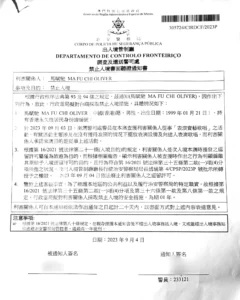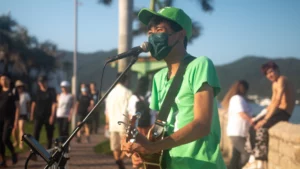The incident took place on the Sunday prior to the publication. The police claimed that the interrogation and expulsion from the territory were due to the fact that Oliver Ma Fu Chi did not have a license to perform on the street. The street artist, on the other hand, assured that he was also questioned by the officers about whether he intended to play “Glory to Hong Kong,” a melody that became popular during the 2019 protests.
Oliver Ma said he was approached by the police shortly after finishing his first song near the Ruins of St. Paul’s. He was informed the following day that he was prohibited from entering Macau for a year and would be escorted out of the territory. Not before being questioned by the officers about the pro-democracy chant: “Have you sung #GlorytoHongKong in Hong Kong? Were you planning to sing it here? What does the song mean?” he cited in his Facebook post.
“Just by taking out my microphone and guitar, my whole family was harassed throughout the day. I had to give the password to my mobile phone, with all kinds of access to my social and personal networks, to the Macau police (…) I couldn’t contact my lawyer, and food was denied to me,” accused the pro-democracy activist.
The police claimed that the musician’s entry into Macau was “only for tourism purposes, and according to relevant reports, the conduct of the interested person (…) clearly deviated from the purpose for which the authorization to enter the territory had been granted.”
For this reason, the permission to stay was revoked, and, “taking into account the objective facts” and to “safeguard the public interest of the region and fulfill the specific duties of the Public Security Police,” it was notified that they “intend to adopt the security measure of prohibiting the interested party from entering for a period of one year.”
The image of the notification was also posted on Facebook by Oliver Ma.

In 2019, a video of Oliver Ma singing “Glory to Hong Kong” surrounded by police went viral. In 2021, he was detained again, with the police alleging that he had organized a gathering that violated COVID-19 pandemic restrictions. However, he was acquitted in May of this year by the court.
A month ago, the Hong Kong government submitted a new request to ban the pro-democracy chant, following an initial rejection by the judiciary.
The government argued that the song, an anonymous creation, has been disseminated or performed “with the intent to incite others to secession or with seditious intent.” The government recalled that it had decided to take legal action after the song was played on several occasions instead of the Chinese national anthem at sporting events abroad.

Currently, singing or playing “Glory to Hong Kong” is illegal under the national security law. Musicians who performed it in public have been prosecuted by the authorities.
Li Jiexin, 69 years old, is currently on trial for “unlicensed performance” after playing the song with an erhu, a Chinese two-stringed instrument, in 2021 and 2022.
In mid-June, the song was removed from streaming platforms, including iTunes and Spotify, after the government initiated legal action.
Plataforma with Lusa



